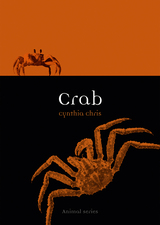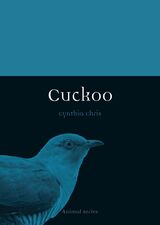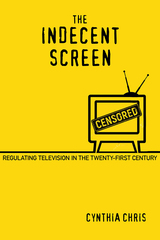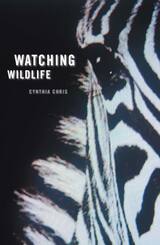4 books about Chris, Cynthia

Crab
Cynthia Chris
Reaktion Books, 2021
What is a crab? What significance do crabs play in the world? In Crab, Cynthia Chris reveals that these charming creatures are social by nature, creative problem-solvers, and invaluable members of the environments in which they live. Their formidable physical forms, their hard-to-harvest and quick-to-spoil flesh, and their sassy demeanor have inspired artists and writers from Vincent van Gogh to Jean-Paul Sartre. Chris sketches vivid portraits of these animals, tracing the history of the crab through its ancient fossil record to its essential role in protecting its own habitats from the threat of climate change.
[more]

Cuckoo
Cynthia Chris
Reaktion Books, 2024
An entertaining and wide-ranging romp through the cultural history of a peculiar bird.
The cuckoo is peculiar for inspiring such divergent ideas: a symbol of foolishness to both Aristophanes and Cocoa Puffs, a reliable harbinger of spring and the hours of a cuckoo clock, and the source of innumerable innuendos inspired by a habit of laying eggs in others’ nests. In this short, entertaining book, Cynthia Chris explores both the natural and cultural history of the cuckoo as well as the many stories told throughout the centuries about this fascinating bird.
The cuckoo is peculiar for inspiring such divergent ideas: a symbol of foolishness to both Aristophanes and Cocoa Puffs, a reliable harbinger of spring and the hours of a cuckoo clock, and the source of innumerable innuendos inspired by a habit of laying eggs in others’ nests. In this short, entertaining book, Cynthia Chris explores both the natural and cultural history of the cuckoo as well as the many stories told throughout the centuries about this fascinating bird.
[more]

The Indecent Screen
Regulating Television in the Twenty-First Century
Chris, Cynthia
Rutgers University Press, 2019
The Indecent Screen explores clashes over indecency in broadcast television among U.S.-based media advocates, television professionals, the Federal Communications Commission, and TV audiences. Cynthia Chris focuses on the decency debates during an approximately twenty-year period since the Telecommunications Act of 1996, which in many ways restructured the media environment. Simultaneously, ever increasing channel capacity, new forms of distribution, and time-shifting (in the form of streaming and on-demand viewing options) radically changed how, when, and what we watch. But instead of these innovations quelling concerns that TV networks were too often transmitting indecent material that was accessible to children, complaints about indecency skyrocketed soon after the turn of the century. Chris demonstrates that these clashes are significant battles over the role of family, the role of government, and the value of free speech in our lives, arguing that an uncensored media is so imperative to the public good that we can, and must, endure the occasional indecent screen.
[more]

Watching Wildlife
Cynthia Chris
University of Minnesota Press, 2006
You and me baby ain't nothin' but mammalsSo let's do it like they do on the Discovery Channel.—Bloodhound GangIt has never been easier for Americans to observe wild and exotic animals from the comfort and safety of their couches. Several cable channels—Animal Planet, the Discovery Channel, the National Geographic Channel—provide around-the-clock wildlife programming while the traditional networks regularly broadcast animal documentaries, late-night appearances by zoologists and their animal charges, and sensationalistic specials about animals attacking hapless humans. Though the ubiquity of animals on television is new, the genre of the wildlife documentary is as old as cinema itself.In Watching Wildlife, Cynthia Chris traces the history of the wildlife genre from its origins in precinematic, colonial visual culture to its contemporary status as flagship programming on global television and explores evolving beliefs about, and attitudes toward, animal subjects. Nature programming and films are consistently presented as real and unmediated reflections of nature. But in Chris's analysis of specific shows (Mutual of Omaha's Wild Kingdom and cable television's Crocodile Hunter) and film and television history (the colonial cinema, the launch of Animal Planet), she points out how—particularly in the genre's preoccupation with mating and the favoritism bestowed on certain species—documentary images of animals are and always have been about prevailing ideologies about human gender, sexuality, and race.Ultimately, Chris's sweeping and cogent account of the wildlife documentary incorporates this frequently overlooked genre into broader debates about media globalization, human-animal relations, and popular scientific discourse.Cynthia Chris is assistant professor of media culture at the City University of New York's College of Staten Island.
[more]
READERS
Browse our collection.
PUBLISHERS
See BiblioVault's publisher services.
STUDENT SERVICES
Files for college accessibility offices.
UChicago Accessibility Resources
home | accessibility | search | about | contact us
BiblioVault ® 2001 - 2024
The University of Chicago Press









